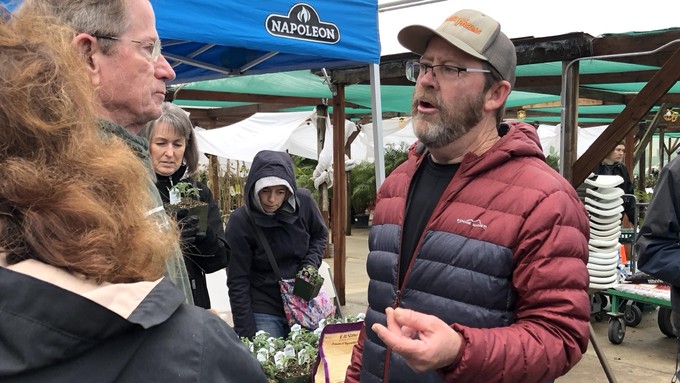
Wild Boar Farms breeder will be at Green Acres in Auburn and Sacramento

Brad Gates, right, answer questions from gardeners after his tomato presentation at Green Acres' Sacramento store in February 2023. Other attendees look over the tomato plant selection he brought with him. Kathy Morrison
The man who brought us more colorful (and flavorful) tomatoes is giving local gardeners an opportunity to get his tomato-growing advice at two in-person events.
Brad Gates, who introduced such popular tomato varieties as Berkeley Tie-Dye and Brad’s Atomic Grape, will be the February guest of “Garden Talk” at Green Acres Nursery & Supply in Auburn and Sacramento.
Gates is the owner of Wild Boar Farms, famous for its multicolored varieties with crazy names. Wild Boar produces “the most outrageous tomato varieties available on the planet,” Gates says on his website. “Our focus is in breeding stunning-looking tomato varieties with extreme flavor. ...
"Our tomato varieties are the result of many years of hard work growing tens of thousands of plants, being very picky about seed selection and capitalizing on some amazing gifts from Mother Nature.”
Gates is always working on new varieties to add to Wild Boar’s collection. Seeds are available online at https://www.wildboarfarms.com/. Transplants will be available at Green Acres as well as Talini’s Nursery, The Plant Foundry and Redwood Barn Nursery in early spring.
“Tomatoes have changed more in the last 10 years than they have in their entire existence,” Gates adds. “The bar is being raised and tomato lovers can now reap the rewards. I consider these tomato varieties the ‘Heirlooms of the Future.’ ”
At 10 a.m. Saturday, Feb. 24, Gates will preview his new tomato introductions for 2024 as well as offer his tomato growing tips at the Green Acres at Eisley’s, 380 Nevada St. in Auburn.
At 10 a.m. Sunday, Feb. 25, Gates will repeat his Garden Talk and share new varieties at Green Acres’ Sacramento store and nursery, 8501 Jackson Road.
Admission to each event is free.
For more details and directions: https://idiggreenacres.com/.
Comments
0 comments have been posted.Sacramento Digs Gardening to your inbox.
Food in My Back Yard Series
May 6: Maintain soil moisture with mulch for garden success
April 29: What's (already) wrong with my tomato plants?
April 22: Should you stock up on fertilizer? (Yes!)
April 15: Grow culinary herbs in containers
April 8: When to plant summer vegetables
April 1: Don't be fooled by these garden myths
March 25: Fertilizer tips: How to 'feed' your vegetables for healthy growth
March 18: Time to give vegetable seedlings some more space
March 11: Ways to win the fight against weeds
March 4: Potatoes from the garden
Feb. 25: Plant a fruit tree now -- for later
Feb. 18: How to squeeze more food into less space
Feb. 11: When to plant? Consider staggering your transplants
Feb. 4: Starting in seed starting
Sites We Like
Garden Checklist for week of May 4
Enjoy this spring weather – and get gardening!
* Plant, plant, plant! It’s prime planting season in the Sacramento area. Time to set out those tomato transplants along with peppers and eggplants. Pinch off any flowers on new transplants to make them concentrate on establishing roots instead of setting premature fruit.
* Direct-seed melons, cucumbers, summer squash, corn, radishes, pumpkins and annual herbs such as basil.
* Harvest cabbage, lettuce, peas and green onions.
* In the flower garden, direct-seed sunflowers, cosmos, salvia, zinnias, marigolds, celosia and asters. (You also can transplant seedlings for many of the same flowers.)
* Plant dahlia tubers. Other perennials to set out include verbena, coreopsis, coneflower and astilbe.
* Transplant petunias, marigolds and perennial flowers such as astilbe, columbine, coneflowers, coreopsis, dahlias, rudbeckia and verbena.
* Keep an eye out for slugs, snails, earwigs and aphids that want to dine on tender new growth.
* Feed summer bloomers with a balanced fertilizer.
* For continued bloom, cut off spent flowers on roses as well as other flowering plants.
* Add mulch to the garden to maintain moisture. Mulch also cuts down on weeds. But don’t let it mound around the stems or trunks of trees or shrubs. Leave about a 6-inch to 1-foot circle to avoid crown rot or other problems.